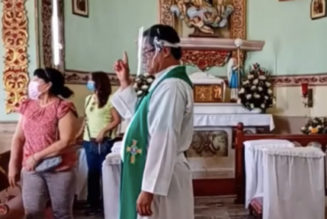
Learning real freedom from some joyful, loving women
‘This time, with freedom!” Sisters Mary Karen and Mary Gabriel implored. It was a rare “off” day for Sisters of Life from different convents getting to be together at their motherhouse in the suburbs of New York. And they did what any healthy family might do on the second night of the octave of Christmas — they gathered around an outdoor Nativity scene with fire for warmth and sang carols, and eventually other devotional songs. Some of the younger sisters (this is a youthful community, not even 30 years since its founding) had just got done with a hopping Pentatonix “O Come, All Ye Faithful” mix.
The funny part of the freedom reply is, of course, that these women are freer than just about anyone I have ever met. Maybe that’s what happens when a Columbia professor of psychology helps found a community of religious women.
(“Off,” by the way, does not mean they take a break from their prayer, because, for one thing, that’s what gives them renewed life day after day, morning, noon, and night.)
In one description of the founding of the Sisters of Life, Mother Agnes Mary Donovan said about its founder, Cardinal John O’Connor: “He was very frank. He often said he was doing what he believed the Holy Spirit had asked him, and if it was of the Holy Spirit, then it would turn out all right.”
I thought of that story as Sister Mary Gabriel gazed on the flames of the fire and talked about the Holy Spirit enflamed in each Christian. When you acknowledge that reality within, great things can happen. Goodness and joy can become contagious. Even more so, hope can be seen and love can be plausible. These women are living witness to this. The day before, most of the Sisters were at the only place of theirs, in Connecticut, that can hold all of them, just short of 100 women.
Those who were not there were celebrating Christmas with the women who live with the Sisters in midtown, some of them pregnant, some of them with babies. The Sisters of Life are the answer to the question Who will help women in need — women who want to not have to choose abortion but don’t know whom to turn to? Turn to the Sisters of Life and their network of over 10,000 co-workers in the United States and Canada. But it’s not merely about abortion, it’s about life. It’s something so much better than our miserable debates about abortion. Looking around at some of the Sisters singing on the second night of the octave of Christmas — one was born in Malaysia, another in Australia. This is an international movement; a revolution of love we are all being invited into. (The Sisters currently have convents in New York, Denver, Philadelphia, Toronto, and Washington, D.C.)
If you go to their website you’ll read, “The Sisters of Life are women who are in love with Love — Love incarnate, crucified, and Risen — and captivated by the truth of the beauty of every human person, created in God’s image and likeness.” And while these women have a particular consecrated spousal relationship to Love, there’s something here for more than these joyful missionaries to the brokenhearted, the trapped, women and men being suffocated by a culture of loneliness, anger, fear, and death.
It’s safe to say the Holy Spirit wanted the Sisters of Life, because it is looking more than all right. Women dedicated to God and His people, with a special commitment to innocent human life. The Sisters of Life were born of an inspiration Cardinal O’Connor had a Dachau. He asked himself, “How could human beings do this to other human beings?”
Speaking of freedom, among them around the fire, I realize I’m still stuck on the Freedom Tower in January, when the governor or New York decided to expand the abortion misery in what was already known as the abortion capital of the country and lit the skyscraper that rose as a sign of resilience and life where the World Trade Center once stood, taken down by terrorists in 2001. I realize some of these women were in elementary school on 9/11. And even as I know that, my hope grows. Life continues and God provides people who see clearly and will pour themselves out for others. Ours doesn’t have to be a culture of cynicism and despair. These women not only show us something greater but draw us into it, something wonderful, something more real than so much that we allow ourselves to become enslaved to.
The Sisters will tell you: “We believe every person is valuable and sacred. We believe that every person is good, loved, unique and unrepeatable. We believe that every person’s life has deep meaning, purpose and worth. In fact, we give our lives for that truth.”
And that seems to me a good prompt for a resolution for the new year, for the rest of life. What more can we do to help people see they are “good, loved, unique and unrepeatable”? With the person who helps you when the grocery self-checkout acts up, with the doctor who saved your life, with the man sitting on the concrete, somewhat despondent, begging for money? People don’t feel good, loved, unique, and unrepeatable. What can each one of us do about that? That’s not simply for women who take particular vows with the Sisters of Life. It’s for the revolution our lives and world needs. This is using freedom well. And it comes only from knowing it about yourself — at which point it becomes harder not too want the same for others.
So, as the Sisters said, “This time with freedom!” — how about that as a mantra for 2020?
This column is based on one available through Andrews McMeel Universal’s Newspaper Enterprise Association.
National Review Institute (NRI) is the nonprofit 501(c)(3) journalistic think tank that supports the NR mission and 14 NRI fellows (including this author!), allowing them to do what they do best: Advance principled and practical conservative journalism. NRI is currently in the midst of its End-of-Year Fund Appeal and seeks to raise over $200,000 to support the work of the NRI fellows. Please consider giving a generous end-of-year tax-deductible contribution to NRI. Your gift, along with all those from the NR Nation, will provide the essential fuel for our mission to defend those consequential principles for which National Review has fought since 1955, and for which, with your support, it will carry the fight far into the future. Thank you for your consideration.







